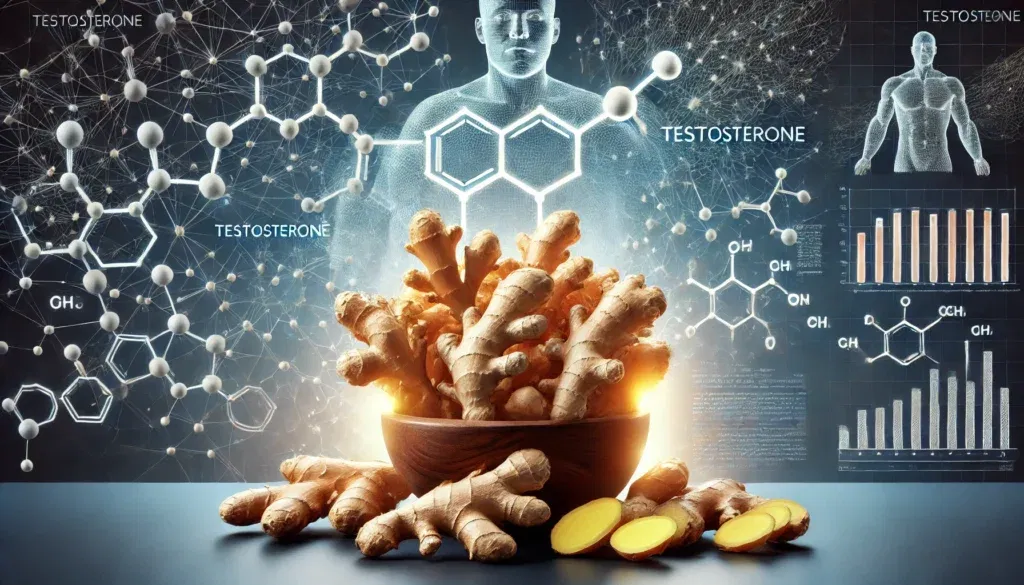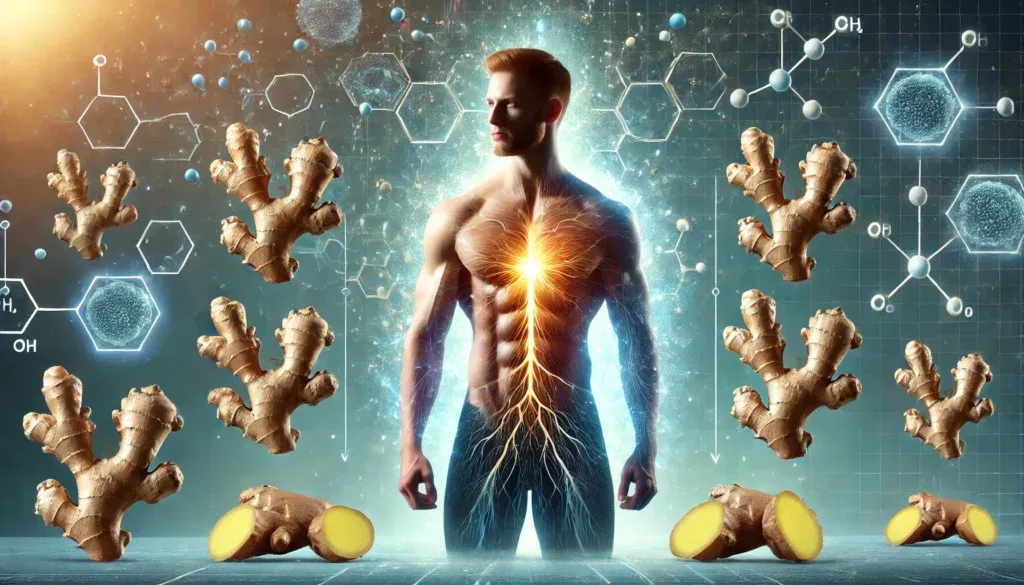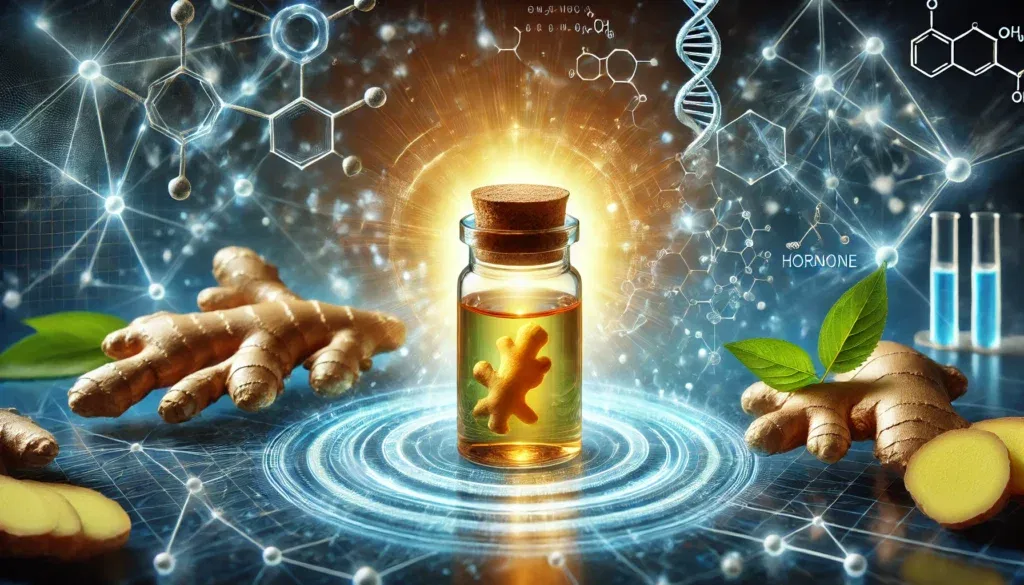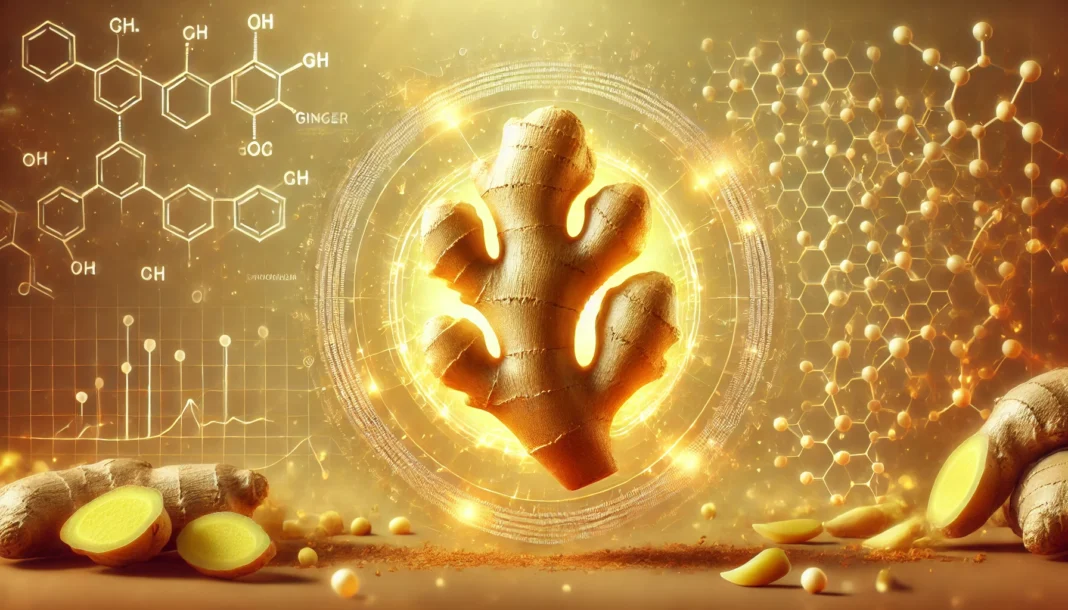Ginger, a common spice found in kitchens worldwide, has long been valued for its medicinal properties. Traditionally used to combat nausea, inflammation, and digestive discomfort, ginger is now gaining attention for its potential role in hormone health. More specifically, scientific interest has turned to the question: does ginger boost testosterone? Given the growing concern over declining testosterone levels among men and the search for natural remedies, understanding ginger’s effects on hormonal balance is essential. This article explores the current scientific evidence behind ginger’s potential influence on testosterone levels, its mechanisms of action, and how it compares to other natural testosterone-boosting agents.
You may also like: How to Increase Testosterone Levels Naturally: Science-Backed Strategies for Men’s Health & Longevity
Understanding Testosterone and Its Role in Men’s Health
Testosterone is the primary male sex hormone, responsible for regulating numerous bodily functions. It influences muscle mass, bone density, libido, mood, and energy levels. While women also produce testosterone, men have significantly higher levels, and a decline in testosterone can lead to various health concerns, including reduced muscle mass, increased body fat, fatigue, and diminished sexual function. As men age, their testosterone levels naturally decline, but lifestyle factors such as poor diet, stress, and lack of exercise can accelerate this process. Given these concerns, many men turn to natural supplements, like ginger, in the hope of maintaining or boosting their hormone levels.

The Science Behind Ginger and Testosterone Regulation
Scientific studies have started to reveal that ginger may play a role in regulating testosterone and other sexual hormones. Research suggests that ginger influences testosterone levels by improving overall testicular function, enhancing blood circulation, and reducing oxidative stress. A study published in the journal Biological Trace Element Research found that ginger supplementation in male rats significantly increased testosterone levels. This was attributed to ginger’s ability to improve luteinizing hormone (LH) function, a key regulator of testosterone production. LH stimulates the Leydig cells in the testes, leading to increased testosterone synthesis. While these findings are promising, further research on human subjects is necessary to confirm these effects.
Ginger’s Impact on Oxidative Stress and Testosterone Production
One of the primary ways ginger may help boost testosterone is through its potent antioxidant properties. Oxidative stress, caused by free radicals, damages cells, including those involved in testosterone production. Ginger contains bioactive compounds such as gingerol and shogaol, which have been shown to combat oxidative stress and inflammation. By reducing oxidative damage, ginger helps maintain the integrity and functionality of Leydig cells, which are responsible for testosterone production. This effect is particularly relevant for aging men, as oxidative stress increases with age, contributing to the natural decline in testosterone levels.
How Ginger Enhances Blood Circulation to Support Testosterone Levels
Optimal blood circulation is crucial for testosterone production, as it ensures the efficient delivery of nutrients and oxygen to the testes. Poor circulation can impair testicular function and lead to lower testosterone levels. Ginger has been widely studied for its ability to improve circulation by reducing blood pressure and enhancing blood vessel dilation. Increased blood flow to the testes promotes a more efficient hormonal response, potentially leading to higher testosterone production. This mechanism highlights another way in which ginger can regulate testosterone and sexual hormone levels naturally.
Comparing Ginger to Other Natural Testosterone Boosters
While ginger shows promise in testosterone regulation, how does it compare to other natural testosterone-boosting agents? Many natural substances, including fenugreek, ashwagandha, and tribulus terrestris, have been studied for their hormone-balancing effects. Fenugreek, for example, contains compounds that inhibit the conversion of testosterone into estrogen, helping maintain higher levels of the hormone. Ashwagandha, an adaptogenic herb, has been shown to reduce stress-induced cortisol levels, which can negatively impact testosterone. Meanwhile, tribulus terrestris is believed to enhance libido and testosterone production through its influence on LH. Compared to these herbs, ginger’s antioxidant and circulation-boosting effects offer a unique and complementary approach to maintaining healthy testosterone levels.
Incorporating Ginger into Your Diet for Hormonal Health
To experience the potential benefits of ginger on testosterone levels, incorporating it into your daily diet is essential. Fresh ginger can be added to smoothies, teas, and stir-fries, while dried ginger is a convenient option for seasoning meals. Ginger supplements, available in capsule or extract form, provide a concentrated dose of its active compounds. While there is no established dosage for testosterone enhancement, studies on rats have used doses equivalent to approximately 1-3 grams per day in humans. As with any supplement, consulting a healthcare professional before starting ginger supplementation is advisable, especially for individuals with existing medical conditions or those taking medications.
Does Ginger Boost Testosterone? A Look at the Evidence and Future Research
While preliminary research indicates that ginger may boost testosterone levels by improving testicular function, reducing oxidative stress, and enhancing blood circulation, more human studies are needed to draw definitive conclusions. The available evidence is promising, but researchers must conduct large-scale clinical trials to determine the extent of ginger’s hormonal effects in humans. Future studies should explore optimal dosages, potential side effects, and long-term benefits to fully understand how ginger can support men’s hormone health.

Frequently Asked Questions (FAQ) on Ginger and Testosterone
1. Does ginger boost testosterone naturally?
Yes, research suggests that ginger can help boost testosterone naturally by reducing oxidative stress and inflammation in the testes. Ginger contains antioxidants and bioactive compounds that support the production of luteinizing hormone, which plays a crucial role in stimulating testosterone synthesis. Additionally, ginger improves blood circulation, ensuring that the testes receive adequate nutrients and oxygen for optimal function. While more clinical trials on humans are needed, preliminary studies in animals have shown a significant increase in testosterone levels with regular ginger consumption. Therefore, adding ginger to your diet may be a natural way to support hormonal balance.
2. How does ginger regulate testosterone and sexual hormone levels?
Ginger can regulate testosterone and sexual hormone levels through its anti-inflammatory and antioxidant properties. It enhances the activity of key enzymes involved in steroidogenesis, the process by which testosterone is produced. Moreover, ginger is known to increase nitric oxide levels, which improves testicular function and hormone secretion. Some studies indicate that ginger also reduces cortisol, a stress hormone that can negatively impact testosterone production. By balancing these factors, ginger helps maintain optimal testosterone and sexual hormone levels in the body.
3. What is the connection between ginger root and testosterone?
Ginger root and testosterone are connected through various biochemical processes. The bioactive compounds in ginger root, such as gingerols and shogaols, help reduce oxidative damage in the testes, which is crucial for sustaining testosterone levels. Additionally, ginger root is rich in zinc, a mineral essential for testosterone synthesis and overall reproductive health. Studies also suggest that ginger can enhance sperm quality by increasing sperm motility and count, making it beneficial for male fertility. Regular consumption of ginger root may contribute to improved hormonal balance and reproductive function.
4. Does ginger increase testosterone in men with low levels?
Yes, ginger has been shown to increase testosterone levels in men with deficiencies, particularly those experiencing oxidative stress or inflammation-related hormonal imbalances. Studies in animals have demonstrated a marked rise in testosterone after ginger supplementation, especially in cases of testicular dysfunction. Ginger improves blood circulation, boosts antioxidant enzyme activity, and enhances the absorption of essential nutrients like zinc, all of which contribute to testosterone production. While more human studies are needed, preliminary evidence suggests that ginger may be a supportive dietary addition for men with low testosterone levels.
5. Can ginger be used to support testosterone levels in aging men?
As men age, testosterone levels naturally decline, leading to symptoms such as fatigue, reduced muscle mass, and lower libido. Ginger may help support testosterone levels in aging men by reducing oxidative stress and enhancing the function of Leydig cells, which are responsible for testosterone production. Furthermore, ginger has been linked to improved insulin sensitivity, which plays a crucial role in maintaining hormonal balance. Regular consumption of ginger, whether in food, supplements, or tea, may aid in sustaining testosterone levels and mitigating age-related declines in hormone production.
6. Does olive oil increase testosterone like ginger?
Olive oil has been found to increase testosterone levels, but it works differently compared to ginger. While ginger improves antioxidant activity and enzyme function in the testes, olive oil enhances cholesterol conversion into testosterone, a key step in hormone biosynthesis. Studies indicate that consuming extra virgin olive oil can increase luteinizing hormone levels and support overall testicular health. Both ginger and olive oil can be beneficial for testosterone production, and incorporating them into a balanced diet may yield synergistic effects.
7. How does olive oil boost testosterone levels?
Olive oil boosts testosterone levels by improving lipid metabolism and enhancing the activity of enzymes involved in steroidogenesis. The healthy monounsaturated fats in olive oil support cell membrane integrity in the testes, allowing for efficient hormone production. Additionally, olive oil contains polyphenols that reduce inflammation and oxidative stress, creating a favorable environment for testosterone synthesis. Incorporating olive oil into meals, such as in salads or cooking, may contribute to better hormonal balance over time.
8. Is there an optimal way to consume ginger for testosterone benefits?
To maximize the benefits of ginger for testosterone, it can be consumed in various forms, including raw, powdered, tea, or as a supplement. Studies suggest that a daily intake of 1-3 grams of ginger powder can yield positive effects on hormone levels. Combining ginger with foods rich in healthy fats, such as olive oil, may further enhance its absorption and effectiveness. Additionally, ginger tea or ginger-infused smoothies can be a convenient way to incorporate it into your daily routine. Experimenting with different methods can help you determine the most effective approach for your needs.
9. Can combining ginger and olive oil enhance testosterone levels further?
Yes, combining ginger and olive oil may have a complementary effect on testosterone levels. Ginger boosts testosterone by reducing oxidative stress and inflammation, while olive oil supports the cholesterol-to-testosterone conversion process. The healthy fats in olive oil also improve the absorption of fat-soluble compounds in ginger, potentially increasing its efficacy. Including both in a well-balanced diet, such as by using olive oil in ginger-based recipes, may enhance overall hormonal health. More research is needed to determine the extent of their combined benefits, but early indications are promising.
10. Are there any side effects of using ginger and olive oil for testosterone support?
Both ginger and olive oil are generally safe for consumption and have minimal side effects when used in moderation. However, excessive ginger intake may cause mild digestive discomfort, heartburn, or interact with blood-thinning medications. Similarly, consuming large amounts of olive oil can lead to increased calorie intake, which may contribute to weight gain if not balanced with a healthy diet. It is always advisable to consult with a healthcare professional before making significant dietary changes, especially if you have existing health conditions or are taking medications. Ensuring a balanced intake of both ingredients can help maximize their benefits without adverse effects.

Conclusion: Should You Use Ginger to Support Testosterone Levels?
For men seeking natural ways to maintain or boost testosterone, ginger appears to be a beneficial addition to a hormone-supportive lifestyle. Its antioxidant properties, circulation-enhancing effects, and potential role in testicular function suggest that ginger could help regulate testosterone and sexual hormone levels. However, while early research is promising, men should approach ginger as part of a holistic strategy that includes a balanced diet, regular exercise, stress management, and adequate sleep. Whether consumed as a food ingredient or supplement, ginger represents a natural and accessible option for those interested in optimizing their hormonal health. As science continues to uncover the full potential of ginger and its influence on testosterone, this ancient spice may prove to be a valuable ally in men’s health and longevity.
testosterone support herbs, natural ways to boost testosterone, hormone balance supplements, best foods for testosterone, ginger health benefits, antioxidants and testosterone, male hormone optimization, lifestyle changes for testosterone, testosterone decline solutions, herbal testosterone boosters, ginger and blood circulation, ginger supplements for men, oxidative stress and testosterone, luteinizing hormone support, benefits of ginger for men, natural remedies for low testosterone, ginger root benefits, testosterone boosting foods, traditional medicine testosterone, superfoods for men
Further Reading:
4 Supplements That May Increase Testosterone
Disclaimer: The information provided in this article is for general informational purposes only. The content does not constitute professional advice of any kind, including but not limited to medical, legal, or financial advice. HisHealthMag and its contributors make no representations or warranties regarding the accuracy, completeness, or reliability of the information presented. Always seek the advice of a qualified professional for any specific concerns or questions you may have. Neither HisHealthMag nor its authors assume any responsibility or liability for any actions taken based on the information provided in this article. The views and opinions expressed are those of the author(s) and do not necessarily reflect the official policy or position of HisHealthMag.





